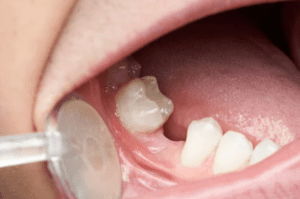Missing teeth can significantly impact not only your smile but also your overall oral health and self-confidence. Without replacement options, you can experience severe side effects. This can include crooked teeth, jaw alignment issues, and bone deterioration. This is because your teeth and jaws rely on all of your teeth to stay healthy. When one goes missing, your other teeth can fall out. Fortunately, modern dentistry offers a range of effective treatment options to address this common concern.

The Consequences of Missing Teeth
Beyond aesthetic concerns, missing teeth can lead to many oral health issues. Gaps in your smile can cause adjacent teeth to shift and become misaligned, potentially affecting your bite and causing jaw pain. The bone structure that supports your teeth may also begin to deteriorate over time in the areas where teeth are missing.
This can lead to further tooth loss and a change in facial appearance. Moreover, missing teeth can impact your ability to chew and speak properly, affecting your overall quality of life. It is essential to address missing teeth promptly to prevent these complications.
Dental Implants: The Gold Standard
Dental implants are considered the gold standard for tooth replacement. They are titanium posts surgically placed into the jawbone to act as artificial tooth roots. Dental implants provide a stable foundation for prosthetic teeth, such as crowns, bridges, or dentures. They restore the appearance of a natural smile and function and feel like real teeth. With proper care, dental implants can last a lifetime, making them a long-term investment in your oral health and well-being.
Bridges: Bridging the Gap
Dental bridges are another popular option for replacing missing teeth. They consist of artificial teeth (pontics) anchored to neighboring teeth using dental crowns. Bridges are an effective solution for replacing one or more missing teeth in a row. They restore the ability to chew and speak comfortably, improve smile aesthetics, and prevent neighboring teeth from shifting.
However, it’s important to note that dental bridges require the alteration of adjacent teeth to support the crowns, which may be a consideration for some patients.
Dentures: Restoring Function and Appearance
Dentures provide a viable solution for individuals missing multiple teeth or entire arches. This option is a removable prosthetic appliance that replace missing teeth and surrounding tissues. They can be either full dentures (replacing all teeth in an arch) or partial dentures (replacing multiple missing teeth while preserving existing natural teeth).
While dentures offer functional and aesthetic benefits, some patients may require an adjustment period to adapt to wearing them. Denture technology has advanced significantly, and today’s dentures are more comfortable, natural-looking, and secure than ever before.
Considerations for Treatment
To determine the most suitable treatment option, it’s important to consult with your dentist. They will assess your oral health, overall health, and individual needs before recommending the best course of action. Factors such as bone health, gum condition, and budget will also be considered.
Your dentist will explain each treatment option, discuss the benefits and potential drawbacks, and help you make an informed decision. Remember, addressing missing teeth is not just about restoring your smile; it’s about preserving your oral health and enhancing your quality of life.
